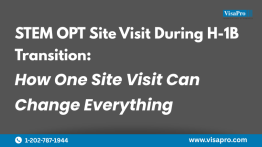Quick Summary:
If you’re an H-1B employee dreaming of launching your own startup while keeping your current job, you’re not alone. The good news? A concurrent H-1B visa allows you to do exactly that. This guide walks you through the emotional, legal, and strategic realities of starting a company “on the side”, without risking your current status.
Exploring a Concurrent H-1B Option As a Startup Founder
Yes, you can apply for a concurrent H-1B through your startup while working on H-1B elsewhere, but it must be structured carefully to meet strict USCIS requirements.
You don’t have to leave your current job to begin building your dream. A concurrent H-1B allows you to work for two employers at once, including a company you own, if you meet all legal criteria, such as business viability and being employed in a specialty occupation.
A Real-Life Example:
An H-1B tech consultant at a Fortune 500 firm came to VisaPro hoping to launch a health AI startup. We helped him set up a compliant corporate structure, secured a concurrent H-1B, and ensured USCIS accepted that his startup, despite being new, could “employ” him independently from his founder role.
What Is a Concurrent H-1B Visa, and How Does It Work?
A concurrent H-1B is a separate H-1B approval that allows you to be employed a second position with a U.S. employer without giving up your primary H-1B occupation.
The additional or concurrent H-1B can be part-time, full-time, cap-exempt, or cap-subject. As long as both jobs meet H-1B eligibility (specialty occupation, wage requirements, etc.), USCIS generally allows this arrangement.
Why This Matters for Founders:
If you’re already on an H-1B and want to work for your own company but also want to maintain job and economic security, this path avoids costly and risky status changes. You keep your main job, and income, while legally working for your startup.
Common Misunderstanding:
Many think starting your own company on H-1B is automatically forbidden. It’s not. It’s how you structure it, whether you obtain proper work authorization to manage your new company and whether USCIS recognizes your startup as a legitimate employer separate from you, that matters most.
Startup on H-1B: Structuring Your Business to Support a Petition
Your startup must qualify as a legitimate U.S. employer able to pay the prevailing wage and operate independently from your personal H-1B status.
Your company must be more than an idea. Even in early stages, it should:
- Be legally formed in the U.S. (LLC, C-Corp, etc.)
- Have a business plan, EIN, and a separate bank account
- Show capacity to pay the offered wage, possibly with seed funding, revenue, or investments
Common Mistake:
Some founders rush to file a petition from a newly created shell company. USCIS will almost certainly reject it without evidence of operations, structure, and funding.
Best Practices:
- Prepare a business plan with job descriptions and a hiring roadmap.
- Show third-party interest (accelerator admission, investment letters, contracts).
- Use external payroll services to reinforce operational legitimacy.

Cap-Exempt Concurrent H-1B: A Unique Loophole Some Founders Can Leverage
If your primary H-1B is through a cap-exempt entity, such as a university, a university-affiliated non-profit or a research center, you are allowed to obtain a concurrent H-1B with your start-up, regardless of the fact you have not gone through the H-1B Lottery.
Cap-exempt concurrent H-1Bs are not subject to the annual cap, which means:
- No April lottery
- Year-round filings
- More flexibility in start dates
What’s the Catch?
Once the concurrent H-1B is approved, you must maintain your H-1B employment with the cap-exempt entity. If you decide to leave your cap-exempt employer, your company will have to enter the lottery to obtain a “regular” H-1B for you. Alternatively, you will need to ensure that your company can be classified as a cap-exempt entity.
Strategic Use Case:
A VisaPro client held a cap-exempt H-1B at a non-profit biotech firm that was affiliated with a university when the client co-founded a new company to provide consultation services to private industry. incubator in partnership with a university. The client was able to obtain a concurrent H-1B to build a thriving consultation business while maintaining his relationship with the non-profit biotech firm.
Concurrent H-1B Risks and Compliance: What Founders Must Know
While a concurrent H-1B is legal, missteps can lead to denial, RFE, or future immigration problems. Compliance is key.
Key Risks to Avoid:
- Overstating your startup’s financial ability to pay wages
- Failing to maintain proper records of both jobs and work hours
- Letting your startup “employ” you informally before H-1B approval
How to Stay Safe:
- Keep your primary H-1B job in good standing
- Avoid working for your startup until the concurrent H-1B is approved
- Stay honest in all filings and avoid “ghost employment”
Why a Concurrent H-1B Could Be the Safer Path to Entrepreneurship
Compared to leaving your job, switching to O-1 or applying for a green card as a founder, a concurrent H-1B lets you build your dream while maintaining your safety net.
This route:
- Minimizes status risk if your startup fails
- Allows you to test ideas before committing full-time
- Provides a legally supported “bridge” into the startup ecosystem
At VisaPro, we’ve helped dozens of founders walk this tightrope. With the right strategy, you don’t have to choose between stability and ambition.
Let’s Build Your Startup, The Legal Way
Your startup journey doesn’t have to start with fear or guesswork. Whether you’re in the ideation stage or ready to hire your first employees, we can help you structure a compliant, strategic, and USCIS-ready plan.
👉 Schedule a Free Startup H-1B Assessment with VisaPro Today.
Let’s talk about your vision, your challenges, and how to make this path work for you.
Frequently Asked Questions (FAQ)
1.Can I work for my startup on H-1B without a concurrent petition?
No. You cannot work for your own startup or any other employer unless and until that entity files a concurrent H-1B petition. Doing so without authorization is a violation of your status. The good news is that you don’t have to wait for approval to start working for your start-up- you can start as soon as the petition is filed.
2.What is a concurrent H-1B visa and how is it different?
A concurrent H-1B allows a person already on H-1B status to take up an additional job with another employer, either part-time or full-time. It requires a new H-1B petition, but doesn’t impact the validity of your existing H-1B.
3.What are the concurrent H-1B risks I should be aware of?
Risks include denial due to inability of your startup to pay the prevailing wage, or USCIS determining that you will not be engaged more than 50% of the time in a “specialty occupation”. Proper structuring and documentation are essential.
4.Can I file a concurrent H-1B petition through my startup even if I’ve never entered the H-1B Lottery?
Yes. Even if your primary H-1B is with a cap-exempt employer and you’ve never been picked in the H-1B Lottery, you can do a concurrent H-1B with your start-up without having to enter the H-1B Lottery.
5.Is it easier to get a green card than a concurrent H-1B if I’m a founder?
Not necessarily. While some founders qualify under EB-2 NIW or EB-1A, these paths are often harder to prove. A concurrent H-1B is usually faster, less subjective, and more secure for early-stage founders.
Reviewed By Immigration Attorney
Ancy S. Varghese is a U.S. immigration attorney with 19 years of business immigration experience at VisaPro Immigration Law Firm. She advises H-1B professionals, startup founders, and entrepreneurs on complex employment-based strategies, including concurrent H-1B filings, cap-exempt structures, and founder-led petitions. Ms. Varghese is known for helping clients balance immigration compliance with startup growth while minimizing status risk and long-term exposure.
Would you like to discuss your case confidentially?
👉 Contact VisaPro to Explore Your Concurrent H-1B Startup Options
We’re here to help you build with confidence, not confusion.
What VisaPro Customers Are Saying
The US [B-1] Visa has always been a tough ride, and being denied a few times it makes it even worse. But thanks to VisaPro and their meticulous processing I was granted a Visa. I would like to thank you and all the people involved in making this a success. I would like to recommend VisaPro to all those who seek peace of mind and hassle free Visa processing.”




 Manas Bhat, Director Operations, First Houston Mortgage India
Manas Bhat, Director Operations, First Houston Mortgage India


